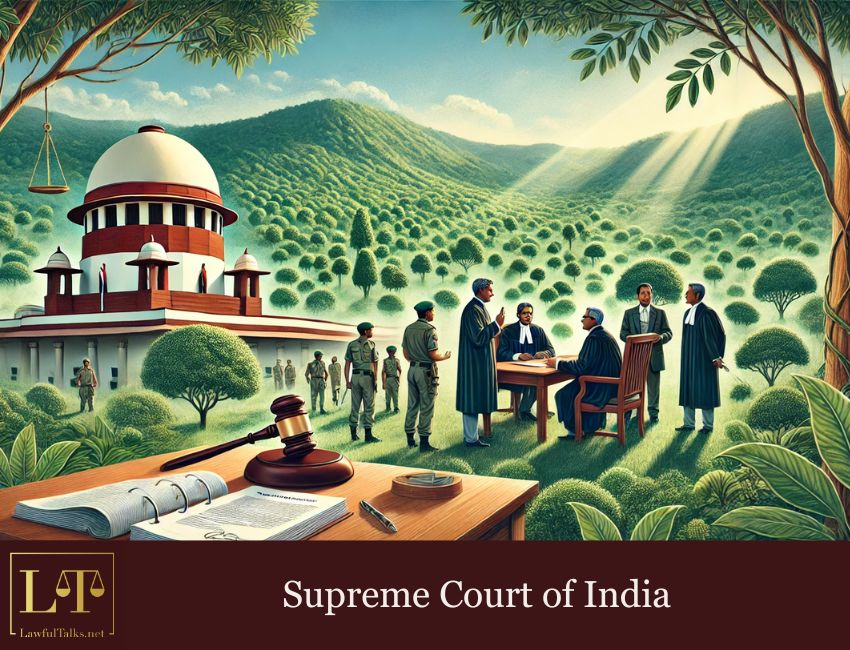Allahabad HC Sets Aside Afzal Ansari's Conviction, Allows Him to Continue as MP

While reviewing a cluster of Writ petitions challenging the 2023 amendments to the Forest Conservation Act (FCA), the Apex court of Justice BR Gavai and Justice A G Masih gave out a stern warning to those non-complaint State Governments and Union Territories(UT’s) who have yet not formed expert committees to identify forest lands. They were also forewarned that the Chief Secretaries/Administrators of those Governments would be held personally liable for delay in constituting expert committees within one month and for dereliction to carry out the exercise in accordance with Rule 16(1) of Van (Sanrakshan Evam Samvardhan)Rules, 2023, within six months there will be no leniency for the same.

Noted the bench, “if the directions are not complied in letter and spirit, we will personally hold Chief Secretaries/Administrators responsible for the lapse and consider taking appropriate steps.” The austere warning came after realization that several states/UT’s had failed to appoint Expert Committees and work that required to be completed in terms of Rule16(1), as per the court’s earlier directives remained unaccomplished till date.
To put the issue in perspective the aforesaid provision 16(1) requires all states/UT’s to prepare integrated record of lands and forest-like areas recognized by Expert committees and if this exercise is undertaken as stipulated it would resolve myriad issues. In February 2024, an interim order was passed in the matter with directions to states and UT’s to act as per the definition of “forest” as laid down in the judgment of TN Godvarman Thirumalpad v. Union of India of 1996.
The order of February 2024 also mentions that the Government of India, within two You will expert committees anointed by states/UT’s as per the aforesaid judgment. Further, the order also mandated that all states/UT’s comply with directions and dispatch the reports of the committees by March 31,2024. All records were to be digitized and maintained by MoEF to facilitate access of the same on their official website by April 15, 2024.
The Additional Solicitor General (ASG) Aishwarya Bhati was told unequivocally by Justice Gavai that , “you will not permit anything which leads to reduction of forest area. And if you are using any forest area for some linear project, then you have to provide that much of land for compensatory afforestation’’. In February this year the court had directed States and the Union to refrain from any action that would reduce forest land’’ pan country unless alternate provision is made for compensatory land.
Petitioners drew attention of the court to forest land being used by authorities for compensatory afforestation leading to depletion of forest land area. It was firmly urged by the applicant that ‘compensatory afforestation’ of jungles and ‘forests’ is an issue that needs careful and serious consideration more so if this land is from the middle of the forest since if this is diverted consequently the whole forest is destroyed.
The applicant’s counsel highlighted the concept of applicability of “compensatory afforestation’’ of forests referring to a report of another matter that seriously cautioned against the implementation of the concept. “Entire jungles being chopped has severe impact on environment and climate change. Until identification process is completed, let them not touch forests’’ pleaded the counsel who specified that the process of identification that is mandated to be undertaken by States remains unfinished since 27 years and in the circumstances any diversion of forests would cause irreparable destruction.
Holding the brief for Adivasis and scheduled tribes, Advocate Prashant Bhushan, held that the exercise of identification that was directed to have been undertaken way back in 1996 remained incomplete resulting in diversion of huge swathes of forest land causing significant damage subsequently.
Appearing for the Union, ASG Bhati expressed limitations in the petition apropos challenges to pre-existing compensatory afforestation, clearing up forests for significant projects of national importance or Central PSUs. The counsel added that, “Problem is ‘recorded forest’ has not kept pace in all states with 1996 directions’’.
It was further stated by the ASG that 33 states/ UT’s have complied with the 1996 directions of the court barring 4 states which have not even constituted expert committees as directed. Jammu and Kashmir (J &K) and Ladakh however are in the process of complying with the order of the court after the Union Government’s intervention. Significantly, the counsel also added that only the states of Sikkim, Gujarat and Orissa have complied with terms of Rule 16.
After due deliberation on submissions the bench observed, "It is the contention of petitioners that Union/States would be using the land which infact is forest, but not recorded as forest, for compensatory afforestation...It is submitted that this would reduce forest coverage...On 3 February, an apprehension was expressed that states/Union would use forest lands for linear projects etc. without doing compensatory afforestation, thereby leading to reduction of forest areas...”
Case Title: ASHOK KUMAR SHARMA, INDIAN FOREST SERVICE (RETD) AND ORS. Versus UNION OF INDIA AND ANR., W.P.(C) No. 1164/2023

Shalini Chavan
Advocate, Bombay High Court
Latest Posts
Categories
- International News 19 Posts
- Supreme Court 352 Posts
- High Courts 367 Posts





























































































































































































































































































































































































































































































































































































































































































































































